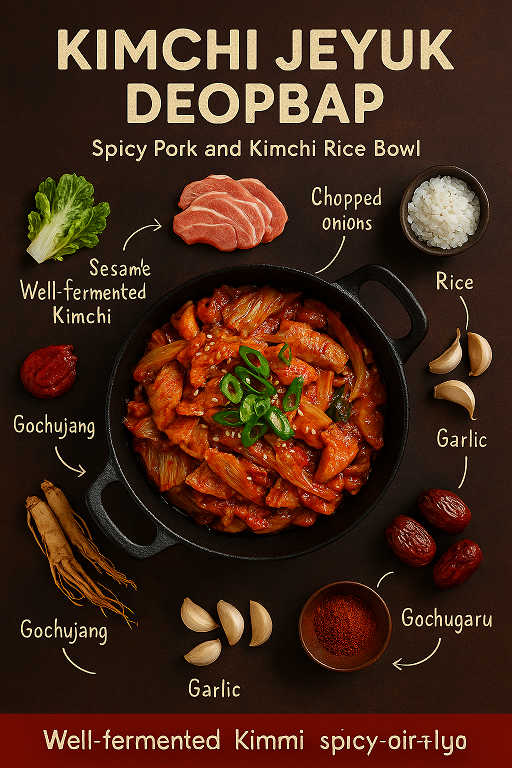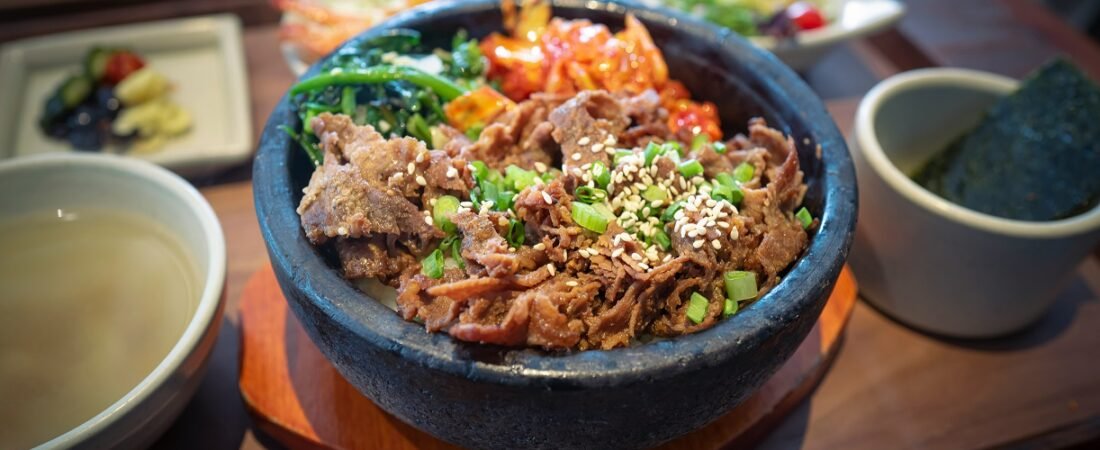Kimchi Jeyuk Deopbap – A Korean Comfort Classic
There are dishes that fill your stomach—and then there are dishes that warm your heart. For me, Kimchi Jeyuk Deopbap is both. This spicy pork and kimchi stir-fry, served generously over a bowl of steaming rice, is one of Korea’s most beloved comfort meals.
When I was a teenager, there was a small, cozy restaurant about 20 minutes away by bus. My sister and I would save up our allowances just to go there once in a while. They made the most delicious Kimchi Jeyuk Deopbap, packed with tender pork, spicy aged kimchi, and lots of stir-fried cabbage. It wasn’t just the flavor—it was the joy of sharing a favorite meal with someone you love. Every time I make this dish now, I’m reminded of that warm memory.
Why Koreans Love This Dish
Kimchi Jeyuk Bokkeum (spicy stir-fried pork with kimchi) is a staple in Korean households. It’s hearty, easy to prepare, and incredibly satisfying. When served over rice (deopbap style), it becomes a one-bowl meal—perfect for busy weeknights or comforting weekend lunches.
It’s also a nutrient-packed dish. The fermented kimchi aids digestion and gut health, the pork provides protein and B vitamins, and cabbage adds fiber and volume, helping you feel full and satisfied.

Ingredients (Serves 2–3) – Kimchi Jeyuk Deopbap
- 300g (10 oz) thinly sliced pork shoulder or belly
- 1 cup well-fermented kimchi, chopped
- 1 cup sliced cabbage (optional but highly recommended)
- 1/2 onion, sliced
- 2 stalks green onion, chopped
- 1 tbsp gochugaru (Korean red pepper flakes)
- 1 tbsp gochujang (Korean red chili paste)
- 1 tbsp soy sauce
- 1 tbsp rice wine or mirin
- 1 tsp sugar
- 1 tbsp sesame oil
- 2 cloves garlic, minced
- 1 tsp sesame seeds (for garnish)
- 2 bowls of warm steamed rice
Cooking Instructions of Kimchi Jeyuk Deopbap
- Marinate the Pork:
In a bowl, mix the sliced pork with gochujang, gochugaru, soy sauce, rice wine, sugar, minced garlic, and a touch of sesame oil. Let it marinate for 10–15 minutes. - Stir-Fry the Aromatics:
Heat a pan over medium heat. Add a bit of oil and stir-fry onions and cabbage for 2–3 minutes until slightly softened. - Cook the Pork:
Add the marinated pork and cook until the meat starts to brown. - Add Kimchi:
Stir in the chopped kimchi and continue cooking until the kimchi is tender and everything is nicely coated in the sauce. - Final Touches:
Add chopped green onions and a drizzle of sesame oil. Serve hot over bowls of rice. Sprinkle with sesame seeds.
Health Benefits of Key Ingredients
- Kimchi: Loaded with probiotics, vitamins A, B, and C, kimchi supports immune health and digestion.
- Pork: A good source of high-quality protein, iron, zinc, and B vitamins (especially B1, B3, and B6).
- Cabbage: High in fiber and antioxidants, cabbage aids in digestion and adds a satisfying crunch without extra calories.
- Gochujang and Garlic: Both have anti-inflammatory properties and can help boost metabolism.

Variations You Can Try
- Tofu Kimchi Stir-Fry: Replace pork with firm tofu for a lighter, vegetarian version.
- Mushroom Jeyuk Deopbap: Add shiitake or oyster mushrooms for an umami-rich flavor.
- Cheese-Topped Jeyuk: Koreans love melting mozzarella cheese on top of spicy pork—it’s fusion but addictively good.
- Wrap It Up: Serve the stir-fry with lettuce or perilla leaves for a low-carb wrap option.
Final Thoughts
Kimchi Jeyuk Deopbap is more than just food—it’s a bowl full of memories, culture, and nourishment. From its spicy kick to its probiotic-rich kimchi, this dish is a perfect example of how Korean food can be both comforting and health-supportive.
If you’ve never tried it before, I encourage you to make it at home. It’s simple, satisfying, and deeply soul-soothing.
Next time, I’ll share a recipe for Korean spicy stir-fried tofu (Dubu Jorim)—another great companion for rice and a healthy alternative.
